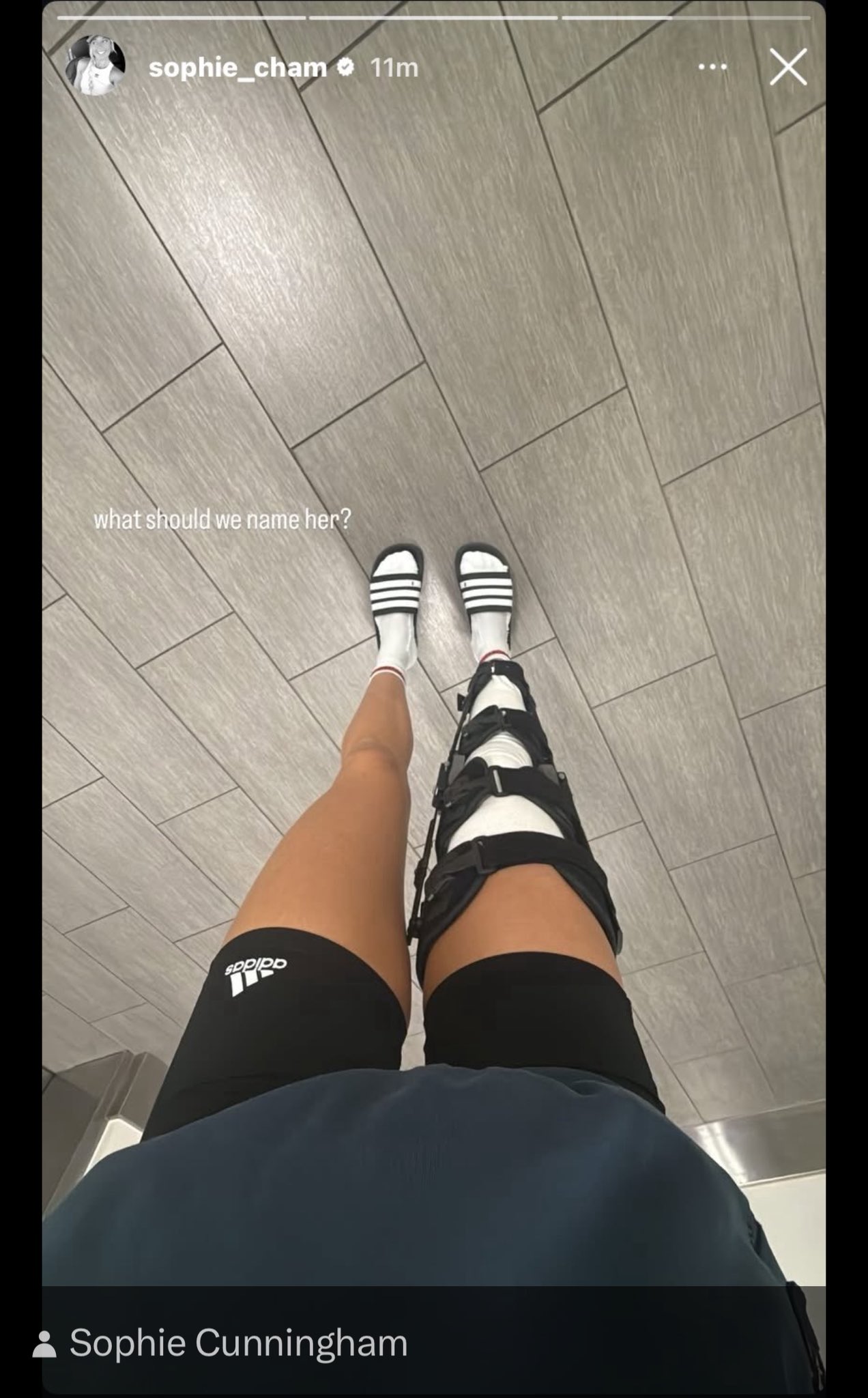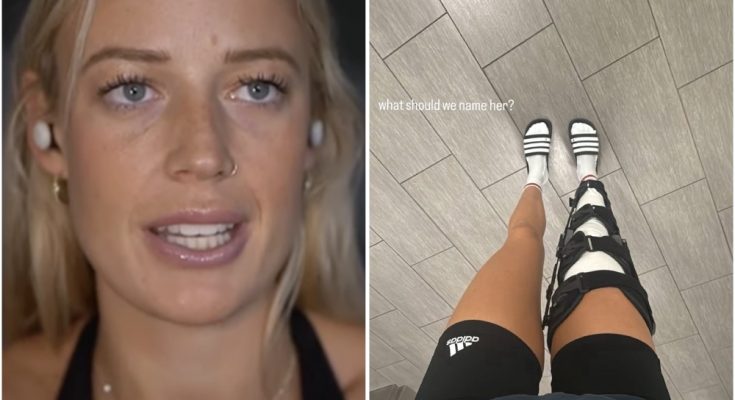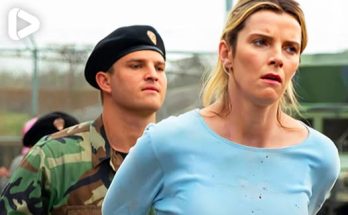The conversation began innocently enough, a spirited debate about a hypothetical video game scenario. On the surface, it was about basketball superstars and clutch shots. But beneath the surface, a different story was unfolding—a deeply human story of resilience, vulnerability, and the unseen battles of a modern professional athlete. Sophie Cunningham, the candid and charismatic WNBA star, sat down to discuss everything from the optics of a video game to the raw reality of a career-altering injury, all while revealing a perspective that is both refreshingly honest and incredibly inspiring.

The initial topic was a new feature in a popular basketball video game allowing WNBA and NBA players to face off. Cunningham’s reaction was immediate and filled with a playful, yet palpable, dread. “You just know we’re going to get dunked on,” she said, an acknowledgment of the physical realities of the sport. It wasn’t a sign of weakness, but a blunt, no-nonsense observation that spoke volumes about the media narratives and public perception surrounding women’s basketball. It highlighted the ever-present pressure on WNBA players to be perfect, to constantly prove themselves against unfair comparisons, and to not take a step back in a fight for equality that has been fought for decades.
This bluntness carried into the next debate: a seemingly impossible choice between three of basketball’s biggest names. When asked who she’d give the ball to for a game-winning shot with ten seconds on the clock, choosing between Caitlin Clark, Paige Bueckers, and Sabrina Ionescu, Cunningham didn’t hesitate. Acknowledging that there was “no right answer,” she chose her teammate, Caitlin Clark, offering a simple yet powerful justification: “No one shoots like she shoots.” It was a choice born from loyalty and a clear-eyed assessment of a unique skill set. The follow-up question, a hypothetical mid-range shot scenario, led her to pick Paige Bueckers, but the initial choice—a pure, confident vote for her teammate—was the kind of decision that speaks to her character. She also offered an insightful, if indirect, analysis of Sabrina Ionescu, describing her as a “field general” with a laser-like focus that would “come for your throat” if you ever slacked off on the court. It was a perfect snapshot of Cunningham’s mind: sharp, opinionated, and a student of the game, capable of dissecting not just skill, but personality and on-court presence.
But the conversation quickly shifted from the hypothetical to the intensely personal. With her hardware—a knee brace—visible, Cunningham was asked about her recent MCL injury. Her account was not one of despair, but of a frank, almost clinical, breakdown of what happened. She explained that her foot was locked to the ground when an opponent fell on her from the side, a “textbook” football-style injury that is less common in basketball. She even offered a touch of gallows humor, recounting how she tried to run in the locker room shower after the incident and nearly took a fall because her knee had turned “black.”
What was most remarkable about this part of the conversation was her attitude. It was a masterclass in choosing perspective. She expressed immense gratitude for the fact that she hadn’t suffered an even more catastrophic injury, noting that she was “very thankful for where I’m at.” Her outlook was startlingly positive, a stark contrast to the grim reality of being sidelined. She saw the four-month recovery as a “quick quick little” process, already looking ahead to her plans for the offseason. This wasn’t denial; it was a conscious decision to focus on the good, to find the silver lining in a situation that could easily have crushed her spirits.
This narrative of resilience was punctuated by a touching and unexpected moment. As the interview was wrapping up, a series of surprise birthday videos began to play. The messages came from her family, friends, and teammates, and their words were a powerful testament to her character. They spoke of her smile, her light, and their immense pride in her journey. The videos were filled with personal touches—a message from her mother, “Mama P,” and a surprise appearance from her dog Brutus—that broke through the polished veneer of a professional athlete. Cunningham’s reaction was pure and genuine; she was overcome with emotion, her voice cracking as she thanked everyone. It was a raw, unfiltered moment that made it clear just how much she is loved and valued by the people in her life. It showed that behind the confident competitor is a human being who needs, and appreciates, the support of her community.
The contrast between the two halves of the conversation was profound. In the first half, we saw the analytical, competitive side of Sophie Cunningham, a woman who understands the game on a deep level and is not afraid to speak her mind. In the second half, we saw her vulnerability, her quiet strength in the face of adversity, and the immense love that buoys her. She talked about the fragility of knees and the physical toll of her career, but she also spoke of a more personal kind of fragility—the kind that makes moments of genuine connection, like a surprise birthday message, feel even more significant.
She even revealed that her family was welcoming a new baby into the world at that very moment, a powerful symbol of new beginnings and the cycle of life continuing even as she faced a personal setback. It was a poignant reminder that while we see athletes as heroes on the court, they are also navigating the same complex and beautiful life experiences as everyone else.
In the end, Sophie Cunningham’s story became about more than just a knee injury. It became a lesson in the power of perspective. She chose to see the recovery not as a setback, but as a temporary pause. She chose to be positive, to celebrate the small things, and to lean on her support system. She showed the world that true strength isn’t just about coming back from a physical injury; it’s about the emotional and mental resilience required to keep your chin up, to find joy in the middle of a challenge, and to remain unapologetically yourself.
The conversation left a lasting impression. It served as a powerful reminder that while we often celebrate the flashy, game-winning moments of an athlete’s career, the true test of their character often lies in the moments we don’t get to see—the moments in the locker room, the quiet battles with an injury, and the personal triumphs and losses that shape their lives. Sophie Cunningham’s story is a testament to the fact that even when sidelined, a true competitor never stops inspiring.



